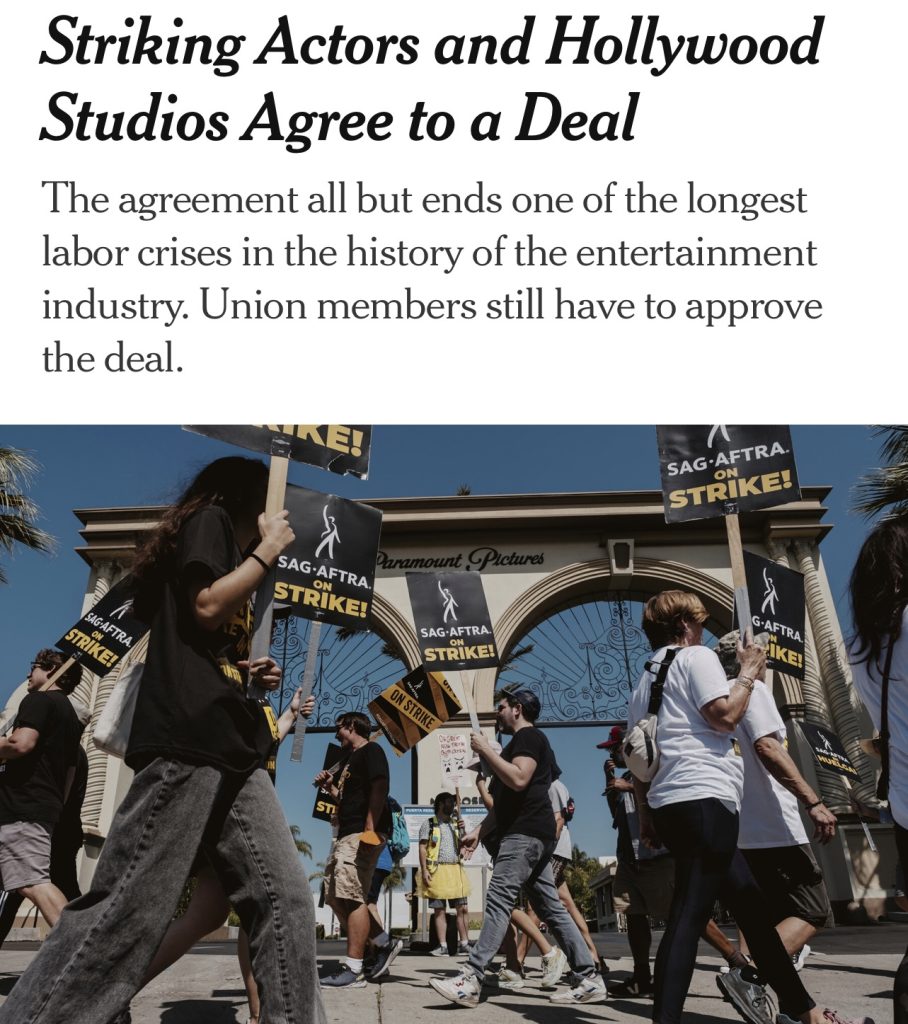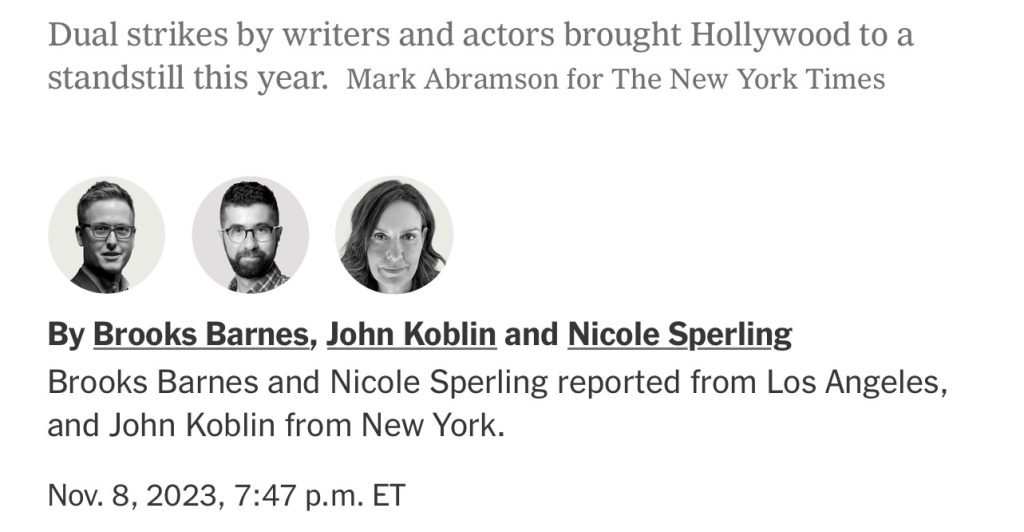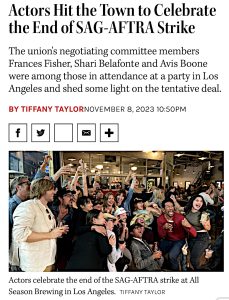Daily
Re-Watched Seven or Eight Times
Posted on 11.14.16: “The truth is that Keaton’s Kroc is not a shithead, but just a hungry, wily go-getter who believes in the organizational basics that made McDonald’s a hit during its early California years (1940 to ’54) and who has the drive and the smarts to build it into a major money-maker.
“Kroc may not be the most ardently ‘likable’ protagonist I’ve ever hung with, but he isn’t exactly ‘unlikable’ either. Your heart is basically with him, and I was surprised to feel this way after having nursed vaguely unpleasant thoughts about the guy (scrappy Republican, Nixon and Reagan supporter) my entire life.
“And Keaton turns the key in just the right way. He doesn’t try to win you over but he doesn’t play Ray as a bad guy either — he plays it somewhere in between, and it’s that ‘in between’ thing that makes The Founder feel quietly fascinating. It allows you to root for a not-so-nice-but-at-the-same-time-not-so-bad guy without feeling too conflicted.
“You know who is unlikable? Nick Offerman’s Dick McDonald — a guy who’s always complaining, always frowning or bitching about something, always a stopper. The bottom line is that Dick doesn’t get it and neither does Mac, but Ray does. And to my great surprise I found myself taking Ray’s side and even chucking when he tells Dick to go fuck himself in Act Three.
“Yes, Ray is a bit of a prick but not a monster. Being a small businessman myself I understand where he’s coming from, and while he’s a little shifty here and there I can’t condemn him all that strongly.
“The Founder is smart, absorbing, realistic and mild-mannered. Nobody goes nuts or screams or slugs anyone. No car crashes, no fucking, no fart jokes, no temper tantrums, no squealing tires, no belly laughs, no heavyosity. It’s just a straight-dealing, no b.s. real-life saga about an American success story. Dogged, bare bones, focused — a film that lays its cards on the table and doesn’t fool around.”
Not Sure Why I’ve Posted This
I’m trying to figure this out as I speak. Sorry…
Director-screenwriter friendo: “Biden somewhat reminds me of when Playboy magazine, competing with FHM and Maxim, tried to make Hugh Hefner relevant to a younger demographic and couldn’t. He came off to young guys as a licentious old man.
“Dr. Caroline Heldman is someone I’d seen on CNN a few times, occasionally billed as a Democratic advisor, but what struck me is to see on her social media accounts that she also moonlights as a rock singer. She’s a liberal Buckaroo Banzai.
“This collision of politics and show business, as well as a generational gap, underscores how Biden, aside from being old, also doesn’t have any sort of dynamic personality that can negate age. Trump’s bombast is immature and grotesque, and yet it makes him seem bizarrely energetic.
“Gavin Newsom would perfectly dovetail into the sensibilities of Heldman’s era.”
Revisiting Childhood or Teen Years
Andrew Haigh‘s All Of Us Strangers (Searchlight, 12.22), which I had problems with due to the beard-stubble sex scenes between Andrew Scott and HE nemesis Paul Mescal, is essentially a time-travel flick.
It’s about a 40ish gay London screenwriter named Adam (Scott) retreating to his ’80s childhood so he can tell his dead suburb-residing parents (Jamie Bell, Claire Foy) that he’s gay** and to basically bring them (and himself) up to speed.
I mostly succeeded at suppressing my negative feelings about Mescal, and I genuinely went with Scott’s performance, and I especially liked Foy’s. But I was basically waiting for Strangers to come to a merciful end. And while I was sitting there in my seat at Telluride’s Galaxy Theatre I was thinking back to an Eisenhower-era Twilight Zone episode about another grown man revisiting his childhood and eventually conversing with his father. A big difference is that the Zone protagonist is straight.
“Walking Distance“, the fifth episode in The Twilight Zone‘s first season (’59 to ’60), is not about “hey, mom and dad, this is who I turned out to be sexually, and I really wanted you to know that…well, that I’m a happy heterosexual and that I more or less turned out to be Jack Nicholson‘s character in Carnal Knowledge.”
Walking Distance, rather, is about a harried man briefly escaping from the pressures of adulthood.
36 year-old Martin Sloane (Gig Young), an anxiety-ridden advertising executive from Manhattan, briefly visits a idyllic yesteryear town — a Willoughby-like, Thornton Wilder-esque hamlet with a merry-go-round in the park. Sloane soon comes to realize that he’s revisiting his own home town, and that the year is 1934, when he was 11 years old. Sloane eventually meets his wise and perceptive father (Frank Overton, who died in ’67) and has a heart-to heart about everything.
The basic message of Walking Distance is that no matter how difficult or stressed your life may seem, and no matter how desperately an older person may want to retreat to the past, you can’t go home again.
The basic message of All Of Us Strangers is that gay guys need to come out to their parents, even if the parents-in-question died in a car crash a long time ago. Which may help them to feel whole.
I guess I’m imagining Walking Distance being about a closeted Manhattan ad executive in 1959 who time-travels and confesses his sexuality to his dad. The pater familias looks at him and says “I’ll always love you, son…I’m just sorry that you won’t be able to be open about yourself until…well, frankly not until the ’70s or 80s and perhaps not even until the ’90s. By which time you’ll be well past your sexual prime and on your way to assisted living. I’m sorry…tough break.”
Or maybe I’m thinking about a 36 year-old Hollywood Elsewhere reader revisiting his childhood in the early to mid ’90s and exploring what he’d like to change or un-do on some level. Or a 46-year-old HE reader retreating back to the early to mid ’80s.
** Adam isn’t comfortable calling himself queer.
“You’re Just Scum”
Last night I didn’t even hear Nikki Haley‘s “you’re just scum” remark to Vivek Ramaswamy. But everyone’s listening to this exchange now. She’ll almost certainly get a bump out of it.
AMC Westport Manager Responds to Light-Level Gripes
Yesterday I posted an 11.8.23 complaint letter that I sent to Caroline Ross, general manager of Westport’s AMC Royale 6.
I explained that Martin Scorcese‘s Killers of the Flower Moon looked professionally illuminated when I saw it last May during the Cannes Film Festival, but when I saw it at the Westport Royale 6 a couple of weeks ago the images were “noticably subdued, a bit muddy, murky…like the sun was behind the clouds.”
I stated that the SMPTE requires that foot lamberts levels be between 14 and 16, and asked whether proper SMPTE-recommended illumination was represented upon her theatre’s screens.
Ross responded last night, and here’s the the heart of her letter: “I have talked to my head of projectors who does checks on our projectors every quarter to make sure lighting and sound is up to par. He has said that all lighting levels are set to each movie.
“The other issue might be just that our projectors are so old, but when he does his [assessments and tune-ups] everything is set correctly. I have never had a complaint or issue about our lighting levels since we do have them looked at every quarter.”
I wrote back immediately. After greeting Caroline and thanking her for replying, I got down to it:
“So let me get this straight — your head of projectors checks your ‘old’ projectors every quarter, or every three months? Right away I wondered why the projectors are allowed to collect dust for 90 days between check-ups. A monthly or bi-monthly check-up seems like a more appropriate regimen given that they’re ‘old’ and possibly in need of more upkeep or fine-tuning…no?
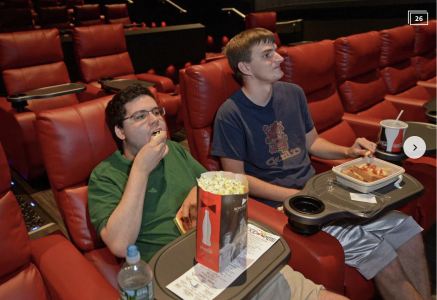
Evan Roberts and Jack Guild settle in at the AMC Royale 6 on Westport Avenue in Norwalk, Conn. (Norwalk Hour photo taken six years ago.)
“Your projector guy also told you that ‘all lighting levels are set to each movie.’ But how could he possibly do that if he only checks the projection standards every three months? Movies arrive and depart all the time. Some last a couple of weeks; others for a month or so.
“What you seem to be saying is that your head of projectors drops in four times a year to check things, but that he doesn’t really focus on light levels. Are you saying that he wings it or improvises to some extent? My general impression, according to what you’re telling me, is that SMPTE foot lambert standards are not really a standard that the AMC Westport Royale plex adheres to.
“Trying again and with all due respect — do you guys have any interest in adhering to SMPTE light standards? Do you generally project at levels of 14 or 16 or…what, 10 or 12 or something lower? What are your exact foot lambert standards? Where are you coming from as exhibition professionals?
“You also haven’t told me if you or your head of projectors use the kind of standard light meter that measures foot lambert levels. Do you?
“You’ve said that when your head of projectors ‘does his checks everything is set correctly.’ But what does ‘correctly’ mean in this regard? I’m sorry but you’re not being specific.
“May I please speak to your head of projectors? Would you ask him to please call or write?
“You’ve said that you’ve ‘never had a complaint or issue about our lighting levels since we do have them looked at every quarter.’ Well, that’s fine, but that doesn’t mean very much as no ticket buyer ever seems to complain about anything in terms of projection. I’ve been a devoted movie fan and an occasional complainer about light and sound for decades, and I’ve found that people are generally sheep when it comes to issues of this kind.
“Only film-industry professionals and hardcore tough nuts like myself complain about sound and light levels.
“Repeating: I saw the world premiere of Killers of the Flower Moon in Cannes last May, and I am telling you straight and true that the AMC Westport version of Killers doesn’t look anywhere near as good as it did at the Salle Debussy on the Cote d’Azur.
“What would you imagine the response would be from Killers of the Flower Moon director Martin Scorsese, or the film’s director of cinematography, Rodrigo Prieto…what would you imagine they would think or say if they were told that the people showing their film at a Westport/Norwalk plex don’t really address projecting issues in terms of foot lamberts? And that an AMC tech guy only tunes up the projectors once every three months?
“Please ask your head of projectors to get in touch. Thanks for responding.”
Jeffrey Wells, Hollywood Elsewhere
Note to AMC management: Please don’t penalize poor Caroline for sending me an honest reply. She’s a very polite and considerate professional, and is a credit to your theatre chain outside of the technical stuff.

When The Bad Guys Threw In Towel
Along with Chris Nolan, George Stevens, Jr. will attend the Academy Museum’s 70th anniversary 4K screening of Shane on 12.10.23.
You can bet that the 91-year-old Stevens, with whom I briefly conversed a decade ago and who spoke to me derisively and snobbishly, will sidestep any mention of The Great Shane Aspect Ratio Bluray Skirmish of 2013 — a conflict that happened between March and April of that year.
Never forget that the honorable Joseph McBride lent his support to the good-guy side, and that Woody Allen probably struck a decisive blow when he allowed me to post his views on the matter.
By any measure it was a bizarre chapter in which Stevens, Jr. advocated (or at least defended) the issuing of Warner Home Video’s Shane Bluray with a 1.66:1 aspect ratio, which the film was not shot in during the late summer and fall of 1951.
Many of us were appalled by the 1.66 thing — a cleavering that would have unmistakably compromised Loyal Griggs‘ original compositions. As we all recall, Warner Home Video ultimately folded and decided to issue the Shane Bluray in the original 1.37:1 aspect ratio. All’s well that ends well.
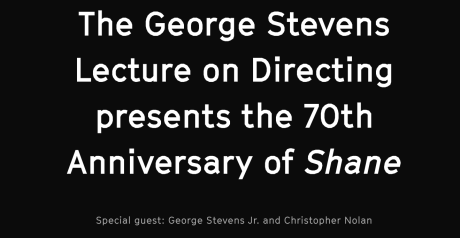
Brian Jones Couldn’t Get Past Himself
Last night I watched Nick Broomfield‘s The Stones and Brian Jones, which is basically about how Jones started the Rolling Stones 61 years ago (at age 20 he advertised for bandmates in the 5.2.62 edition of Jazz Weekly) and was the band’s “uncontested leader” until they began to move away from blues covers in ’65 due to Mick Jagger and Keith Richards beginning to write more and more of their own material.
Jones resented the dilution of the Stones’ blues cover band identity and particularly Jagger-Richards becoming more dominant figures and Jones becoming less of one.
Alas, when the druggy-mystical period of the mid to late ’60s kicked in Jones became more and more of a hostile, sullen, indifferent or undermotivated fellow and certainly a major druggie, contributing less and less to the band’s album output.
The Stones fired his scowling, resentful ass in June of ’69, and Jones drowned in his swimming pool on 7.3.69.
The Stones and Brian Jones is therefore a cautionary tale that says “adapt or die.”
Jones was fine as long as the Stones were playing Muddy Waters, Slim Harpo and Howlin’ Wolf covers, but he couldn’t or wouldn’t submit to the Jagger-Richards era. He basically sulked himself to death.
Broomfield doesn’t touch the fact that Jones was short but he was — only 5’6″, or roughly the same height as Alan Ladd and at least an inch shorter than Frank Sinatra. I once read a Jagger quote in which he called Jones “just a little guy.” Do you think he used this description because he admired his stature?
Jagger to Rolling Stone editor Jann Wenner in ’95, answering whether or not he felt guilty about driving Jones to despair and apparent suicide:
“No, I don’t really. I do feel that I behaved in a very childish way, but we were very young, and in some ways we picked on him. But unfortunately, Brian made himself a target for it. He was very, very jealous, very difficult, very manipulative, and if you do that in this kind of a group of people you get back as good as you give, to be honest.
“Plus I wasn’t understanding enough about his drug addiction. No one seemed to know much about drug addiction. Things like LSD were all new. No one knew the harm. People thought cocaine was good for you.”
Broomfield’s doc (co-written by Broomfield and Marc Hoeferlin) is very good and a lot of fun in its spirited recollections of the ’62 to ’65 era. Recommended viewing.
CNN Poll: Biden Is All But Finished
A second poll is claiming that Mumbling Joe is polling significantly behind The Beast.
Right now, Biden is polling above where Jimmy Carter was in ’79 but two points below where Trump was in ’20. Even Zoomers and Millennials are siding more with Trump….what the fuck? It’s the age thing, for God’s sake — nobody wants a doddering, slurry-voiced, neck-waddled great grandfather running the show.
If Joe hangs tough and loses to Trump, his name will be mud for generations because he will have set the stage for a tyrannical, sociopathic, anti-Democratic bully boss to reclaim power when all the indications are/were that Joe would lose. Good God, how blind can everyone be?
Given that a generic Democrat is polling ahead of Trump right now, the responsible thing would be for Joe to bail on his re-election bid and let Gavin Newsom step in.
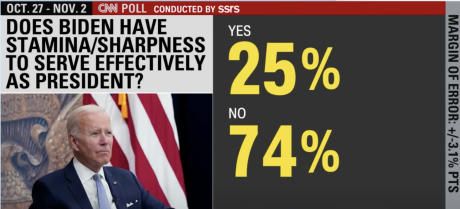
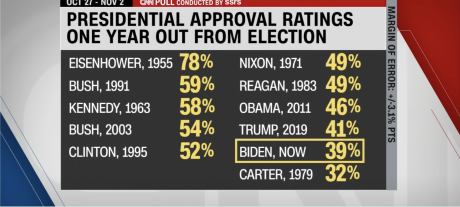
“Atrocious With A Capital A”
David Poland very rarely blurts it outbut when he does, he’s great.
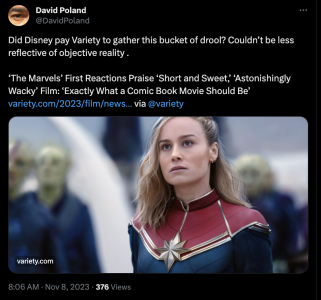
I reviewed THE MARVELS, which was NOT GOOD, though Iman Vellani still came out a winner. I'd never seen an episode of MS. MARVEL before so she really impressed me. As for the rest? Time for Mr. Feige to clear house, as the Parliament ain't getting it done. https://t.co/zbIWf3Qeg9
— Jeff Sneider (@TheInSneider) November 8, 2023
HE to AMC Westport Royale Manager — Light-Level Gripes
DATE: 11.8.23
FROM: Jeffrey Wells, Hollywood Elsewhere
TO: Caroline Ross, general manager, AMC Royale 6 in Westport, CT.
RE: Screen illumination levels
Caroline,
I’m Jeffrey Wells of www.hollywood-elsewhere.com, and I’m writing to convey concern about the screen light levels (or foot lambert levels) at the AMC Westport Royale plex, which, I’ve been told, you’re the general manager of.
I’ve been attending the Cannes Film Festival for 23 years, and when I saw Killers of the Flower Moon at the Sally Debussy last May the images were fully rendered and totally satisfactory.
When I saw Killers at the Westport Royale 6 a couple of weeks ago the images were noticably subdued, a bit muddy, murky…clearly being presented at lower-than-intended light levels. Like the sun was behind the clouds.
I had the exact same impression when I watched Priscilla there a few days ago. It was as if the story was happening inside a barely illiuminated closet or a shadowy shoebox of some kind. The images made me feel trapped. Depressed even. No one’s life has ever been this dark, not even Priscilla Presley‘s during her perverse marriage to Elvis.
I’m sure you understand that it’s part of your job to maintain proper (i.e., SMPTE-recommended) foot-lambert levels on all of your screens. SMPTE requires that foot lamberts levels be between 14 and 16.
In order to check this you need to own a light meter, and with this device you have to check the light levels without a movie playing — you have to check with just pure light being thrown on to a blank screen.
Do you own a proper light meter? Have you checked the light levels on all your screens? If so, what are the foot lambert readings? Do they meet SMPTE’s recommendations? I’d be greatly surprised if they’re between 14 and 16. As noted, the Westport Royale images are definitely subdued.
I say this knowing that AMC hasn’t employed projectionists for many years — it’s all done through some kind of soul-less computerized system.
I look forward to your reply.
Regards,
Jeffrey Wells, HE


